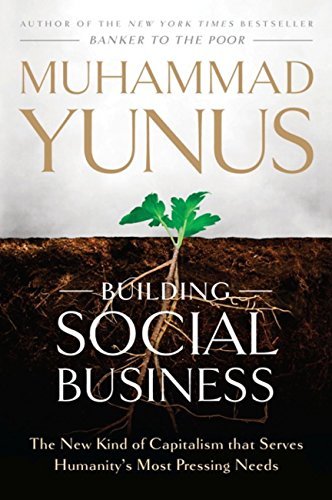What is social business? And how is it different from Social Enterprise?
The term “social business” in European literature has no distinction between social enterprise and social business – they use the term interchangeably. For our purposes we have chosen to make a distinction between social enterprise and social business: the business model that Muhammad Yunus has actively promoted and exemplified in his social entrepreneurial career.
This business model when observed at first glance may seem either extremely altruistic or a pipe-dream for the capitalist minded individual. That may be true, but when you look at the empire, yes empire, the Grameen Group (Muhammed Yunus’ companies born from his original company Grameen Bank based on micro-finance) now counts an impressive 21 social business ventures to its family.
It is true that the social business model is designed with poorer countries in mind, where profit seeking initiatives only create barriers for goods and services that could otherwise be accessible (with some ingenuity) to these populations. Even so, there are poor segments in otherwise rich countries, and this business model if applied with the intent it was created for, can progressively function as a tool to eradicate poverty.
As for the definition, the best source is the original source. Below are the key concepts as described in “Building Social Business: The New Kind of Capitalism that Serves Humanity’s Most Pressing Needs” by Muhammad Yunus
Glossary of terms
Non-loss: A distinction from non-profit organizations: The aim for a social business is to have no loss, but can still make a profit.
Non-dividend: shareholders at no time receive a return on investment. What the investor put into the business will be returned at no extra increase of inflation or interest. 20.000 ISK today will be the same in 10 years’ time.
Investor owned: the social business must have individuals or organizations that take on the role of investor with purely social good as their motive (as above they do not receive any return over and above their original investment). The reason here is aligned more so with investors in a profit seeking business (which is investor owned), as opposed to an NGO (which is board controlled).
Definitions
Social business: a non-loss, non-dividend, investor owned organization, where 100% of it‘s resources are for social good. All surplus (profit) is reinvested into the business, eg, 100% is for profit social. There are two distinct types of social businesses.
Type 1: non-loss, non-dividend, investor owned. It solves a social problem & is owned by investors who reinvest their profits in expanding & improving the business. The investors do not earn a profit or dividend and can take out the original investment over time, but dollar for dollar.
Type 2: A profit-making company owned by poor people, either directly or through a trust that is dedicated to a predefined social cause. Profits go to alleviating poverty.
The Principles of social businesses:
1) The business objective is to overcome poverty, or one or more problems (such as education, health, technology access, and environment) that threaten people and society- not to maximize profit.
2) The company will attain financial & economic sustainability
3) Investors get back only their investment amount. No dividend is given beyond the return of the original investment.
4) When the investment amount is paid back, profit stays with the company for expansion and improvement.
5) The company will be environmentally conscious
6) The workforce gets market wage with better-than-standard working conditions
7) Do it with joy!!!















Really informative article. Want more.